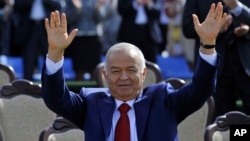Uzbekistan's veteran leader Islam Karimov easily won another five years at the helm of Central Asia's most populous nation in an election that Europe's main security body criticized for lacking genuine opposition.
Karimov, a 77-year-old former Communist Party apparatchik, received 90.39 percent of Sunday's vote, according to preliminary results released by the Central Election Commission on Monday. Turnout was 91 percent, it said.
Karimov has ruled his mainly Muslim nation of 30 million since 1989, first as its Soviet-era party leader and then as elected president. He brooks no dissent and human rights bodies count his among the world's most repressive governments.
Russian President Vladimir Putin promptly congratulated Karimov on his re-election, saying in a message that the vote was proof of his “high authority among his compatriots”.
No independent candidates were allowed to take part in the election. The three hopefuls in running represented parties mainly loyal to Karimov and praised him during their campaign.
“The figure of the incumbent dominated a political landscape without genuine opposition,” election observers sent by the Organization for Security and Cooperation in Europe (OSCE) said in a statement issued on Monday.
“In this environment, persistent legal and organizational shortcomings of the electoral process remained unaddressed.”
Karimov was elected for the fourth time, although the constitution restricts the presidency to two consecutive terms.
“This was in contravention of the rule of law and raises doubts about the [Central Election] Commission's independence,” said Tana de Zulueta, head of the monitoring mission of the OSCE's Office for Democratic Institutions and Human Rights (ODIHR).
Uzbekistan has never held an election judged to be free and fair by the West.
New York-based Human Rights Watch cites its sources as saying that there are between 10,000 and 12,000 political and religious prisoners in Uzbekistan.
Karimov justifies his tough methods, saying he wants to prevent any rise of radical Islam in Uzbekistan.
His relations with the West chilled after government troops suppressed an uprising in the eastern town of Andizhan in 2005, killing hundreds of protesters.
But ties with the United States and the European Union thawed later as Uzbekistan became a key route of supplying NATO-led forces fighting in neighboring Afghanistan. NATO opened its Central Asia office in the Uzbek capital Tashkent last year.
The ODIHR observers said local media did not provide voters with alternative views to make an informed choice. Authorities declined to accredit most Western media, including Reuters.





